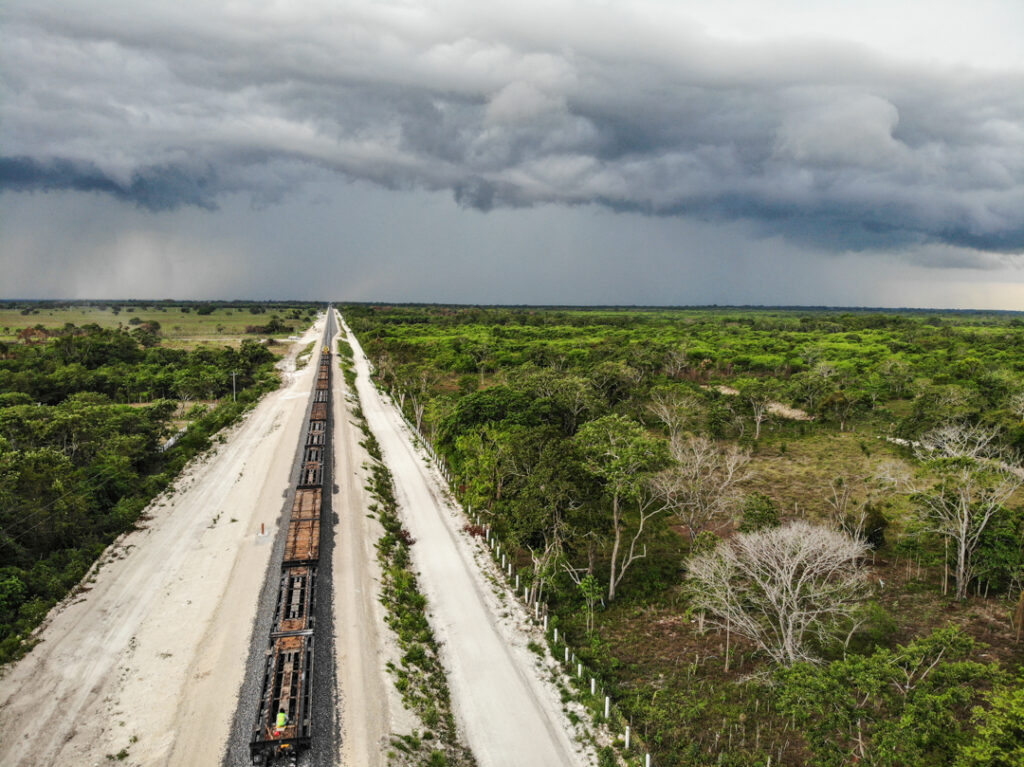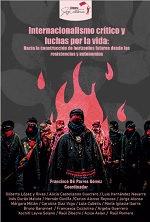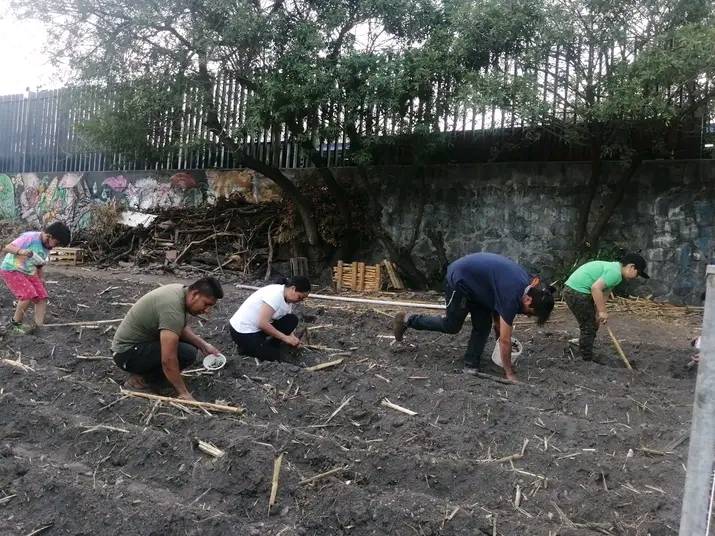Tenth Part: Regarding pyramids and their uses and customary regimes.
Conclusions from the critical analysis of MAREZ and JBG.
(Fragment of the interview with Subcomandante Insurgente Moisés
during the months of August-September 2023,
in the mountains of Southeast Mexico)
November 2023.
Introduction. –
Who built Thebes of the 7 gates? In the books you will read
the names of kings. Did the kings haul up the lumps of rock?
And Babylon, many times demolished, who raised it up so many times?
In what houses of gold glittering Lima did its builders live? Where,
the evening that the Great Wall of China was finished, did the masons go? Great Rome
is full of triumphal arches. Who erected them?
Bertold Brecht.
Known is the obsession that dominant systems have, throughout their history, in rescuing the image of the defeated dominant classes or castes. As if in the winner inhabited the worry of neutralizing the image of the defeated: avoiding his fall. In the study of the remains of the defeated civilization or culture, emphasis is usually placed on the great palaces of the rulers, the religious buildings of the high hierarchy, and the statues or monuments that the dominant people of that time made of themselves.
Not always with genuine anthropological or archaeological interest (it is not the same thing), for example, are the pyramids studied. Its architectural-religious sense –sometimes also scientific–, and what tourist brochures (and political programs across the spectrum) call “the splendor of the past.”
It is natural that the different governments take notice and, not without longing sighs, concentrate on kings and queens. The great palaces and pyramids can be pointed out as references of the scientific advance of those times, of the social organization and of the causes «of its development and decline», but no ruler likes to see his future reflected in the past. That is why they twist past history and it is possible to reschedule foundations of cities, empires and “transformations». So, without realizing it, every selfie taken at archaeological sites hides more than what it shows. Up there, the winner of today will be the defeated of tomorrow.
But, if there are no mentions about these constructions having someone who designed them –their architects, engineers and artists–, there will be even lesser references to «the labor force», that is, to the men and women on whose backs (in more than a sense) were built the wonders that amaze tourists from all over the world, while they make time to go to the club, the mall and the beach.
From that point to ignoring that the descendants of that “labor force” remain alive and active, with language and culture, there is only one step. The natives who built, for example, the pyramids of Teotihuacán and the Mayan area in the Mexican southeast, exist (that is, resist) and, sometimes, they add to their resistance that subversive component that is rebellion.
In the case of Mexico, the different governments prefer the natives as living crafts and, sometimes, as choreography ad hoc. The current government does not represent any change in this (well, not only in that, but that is not the point). Native peoples continue to be objects of alms (that aspirin for scoundrels), electoral hauling, artisanal curiosity and a vanishing point for those who administer the ongoing destruction: “I am going to destroy your life, that is, your territory; but don’t worry, I’m going to preserve the pyramids of those who exploited your ancestors and those funny things you say, and dress and do.»
Having said this, this “image” of the pyramid –the narrow upper tip and the wide lower base–, is now used by Subcomandante Insurgente Moisés to explain to us something of what was the analysis (ferocious and implacable, in my opinion) of the work of the MAREZ and Good Government Juntas.
The Captain
Some history, not much, just 30 years
The MAREZ and Good Government Juntas were not all bad. We must remember how we got to them. For the Zapatista towns they were like a school of political literacy. A self-literacy.
Most of us did not know how to read, write, or speak Spanish. Furthermore, we spoke different languages. That was good, because then our idea and our practice did not come from outside, but rather we had to search in our heads, in our history as indigenous people, in our own way.
We had never had the opportunity to govern ourselves. We were always governed. Even before the Spanish, the Aztec empire, which the current government loves very much –I think because they like bossy people— oppressed many languages and cultures. Not only in what is now Mexico, also in what is now Central America.
The situation we were in was one of death and despair. They closed everything to us. There were no doors, no windows, no cracks. As if they wanted us to drown. So, as they say, we had to open a crack in that wall that enclosed us and condemned us. As if everything were darkness and with our blood we lit a little light. That was the Zapatista uprising, a little light in the darkest night.
Then it came that many people asked for a ceasefire, that we had to talk. The citizens already know about that. The same thing had happened to many of them as to us, that bad governments never fulfilled their word. And they do not comply because governments are the main oppressors. So we had to choose if we hope and wait that one day they comply, or if we look for a solution on our own. And we chose to find our way.
And well, you had to organize for that. We had organized and prepared for 10 years to take up arms, to die and kill. And then it turns out that we had to organize ourselves to live. And living is freedom. And justice. And to be able to govern ourselves as people, not as little children which is the way governments see us.
That’s where it got into our heads that we have to make a government that obeys. In other words, that it did not do as it pleased, but rather, did what the people say. In other words, “command by obeying”, which are the words that today’s scoundrels plagiarize (in other words, they do not only plagiarize theses. Editorial note).
So with the autonomous municipalities we learned that we can govern ourselves. And that was possible because many people supported us, without any interests, to find the path of life. In other words, those people did not come to see what they could get –like those that I imagine you are going to tell outsiders when you talk about 30 years—, but rather they really committed themselves to a life project. And there were those who wanted to tell us how we should do it. But we did not take up arms to change the boss. There is no good boss. But there were other people who did respect our thoughts, our way.
The value of the word.
When we obtain that support, it is like a commitment that we make. If we say that we need support to create schools and clinics, to prepare health and education promoters, to give an example, then we have to comply. In other words, we cannot say that it is for one thing and use it for another. We had then and have now to be honest, because these people do not come to exploit us, but to encourage us. That’s how we saw it.
So we have to put up with the attacks and the bullshit from the bad governments, from the landowners, from the big companies, who are trying hard to test us to see if we can endure it or it is easy for us to fall into a provocation so they are able to accuse us of telling lies, that we also want power and pay. And the thing about power is that it is like a disease that kills good ideas and corrupts, that is, it makes people sick. And there you have a person who seems like a good person, well, with power, he goes crazy. Or maybe he was already crazy and power sort of stripped naked his heart.
So we think that we need to organize, for example, our health. Because of course we saw and see that what the government does is a big lie that is only to steal and does not care that people die, especially if they are indigenous.
And it happened that, when we make that crack in the system and look out, we see many things. But also many people see us. And among those people, there are those who looked at us and took the risk of helping and supporting us. Because what if we are liars and don’t do what we say? But hey, they took a risk and they committed us.
Look, out there, in the cities, giving your word is no good. They can say one thing in one moment, and a minute later they say the opposite and is as if nothing had happened, all is calm. There is, for example, what they call “mañanera”, that one day they say one thing and another day the opposite. But, as it pays, they applaud him and are happy because he gives them alms that do not even come from his work, but from what working people give to governments with taxes, which are like the “cobro de piso” of disorganized crime.
So those people support us and we start little by little with preventive medicine. Since we had already recovered the lands, we improved our diet, but more was needed. So, health. We must recover herbal knowledge, but it is not enough, science is also needed. And thanks to doctors, that we call “fraternities” because they are like our brothers, who got on board and guided us. So the first Health trainers were born or formed, that is, those who prepare the promoters.
And also education, especially Castilian. Because for us Spanish is very important because it is like the bridge through which we can communicate and understand each other between different languages. For example, if you speak Tzeltal, you are going to struggle to communicate with the Cho’ol language, or Tzotzil, or Tojolabal, or Zoque, or Mame, or Quiché. So, you have to learn Spanish. And autonomous schools are very important for that. For example, our generation speaks combined tongue and Spanish, that is, not all well, that is, we speak crooked. But there are already generations of young people, who learned in autonomous schools, who know Castilian better than some citizens. The late SupMarcos said that these young people could correct the writings of university students. And you know that, before, to make a complaint, you had to go to the Command to write it. But then not anymore. In each autonomous authority there was one writer, and well, it worked.
Then it is like one advancement kind of pushes another. And soon after, these young people want more, to learn more. So we organize our health in each town, each region and zone. We are advancing in each area of health, midwives, medicinal plants, bones, laboratories, dentists, ultrasound, among other areas, there are clinics. And the same in school, that is, education. We say school, because we adults also lack education, it is very broad for us, education, and not just children and adolescents.
Furthermore, we organized productive work because we already had land, which was previously in the hands of landowners. And so we work as a family and as a collective in the cornfield, the bean fields, the coffee fields, vegetables, and farms. And some livestock, which is used more for economic emergencies and for holidays. The collective work allowed the economic independence of women comrades and that brought many more things. But they have already talked about that.
A school.
In other words, we learned to govern ourselves and thus we were able to put aside bad governments and organizations that say they are leftist, progressive and I don’t know what else. 30 years learning what it means to be autonomous, that is, we direct ourselves, we govern ourselves. And it has not been easy, because all the governments that have passed from PRI, PAN, PRD, PT, VERDE and MORENA, their desire to destroy us does not end. For this reason, just as in past governments, in this one they say that we have already disappeared, or that we have already fled, or that we are already very defeated, or that there is no longer any Zapatista, that we went to the United States or Guatemala. But you see, well here we are. In resistance and rebellion.
And the most important thing we learned in the MAREZ is that autonomy is not about theory, about writing books and making speeches. It is something that needs to be done. And we have to do it as towns, and not wait for someone to come and do it for us.
All of this is, let’s say, the good thing about MAREZ: a school of practical autonomy.
And the Good Government Juntas were also very important because with them we learned to exchange ideas about struggles with other brothers from Mexico and the world, where we saw it right we took it and where we saw it was not, we discarded it. Some tell us that we have to obey just as they say. Where is that going to happen? If we put our lives at stake. In other words, that is what we are worth: our blood and that of generations that came before and those to come. We are not here for anyone to come and tell us what we are going to do, even if they say that they are very knowledgeable. With the JBG we learned to meet and organize, to think, to give an opinion, to propose, to discuss, to study, to analyze and to decide for ourselves.
So, as a summary, I tell you that the MAREZ and JBG helped us learn that theory without practice is pure words. And practice without theory, well it is as if you walked like a blind man. And since there is no theory of what we started to do, that is, there is no manual or book, then we have also had to make our own theory. We stumbled through theory and practice. I think that’s why the theorists and the revolutionary vanguards don’t like us very much, because we didn’t just take away their jobs. We also showed them that talking is one thing and reality is another. And here we are, the ignorant and backwards, as they call us, the ones who cannot find the way because we are peasants. But here we are and even if they deny us, we exist. Too bad.
The Pyramid.
Well, now it’s time for the bad things. Or rather not bad, but it proved that it will no longer be useful for what is to come. In addition to the inherent flaws. As you tell me, we will talk later about how all of this started, about how it got into our heads, we’ll see it later.
The main problem is the damn pyramid. The pyramid separated the authorities from the towns, they distanced themselves between towns and authorities. The proposals from authorities did not go down as they were to the people, nor do the opinions of the people reach the authorities.
Because of the pyramid, a lot of information is cut, the guidelines, suggestions, support of ideas that the CCRI comrades explain. The Good Government Junta does not fully transmit and the same thing happens when things are explained to the Authorities of the Zapatista Rebel Autonomous Municipalities, the same again is repeated when the MAREZ inform the assemblies of authorities of towns, and finally this is what happens with the authorities of the towns when they explain to each town. Many cuts of information or interpretations, or additions that were not there originally.
And many efforts were also made in the training of authorities and every 3 years new ones leave and enter. And the main base of village authorities is not being prepared. In other words, no relays were formed. “Government collective” we said and it was not fully fulfilled, the work was rarely done this way and the greater part what not fulfilled, both in MAREZ and in the JBG.
It was already falling into wanting to decide themselves, the authorities, the tasks and the decisions, as in MAREZ and JBG. They wanted to leave aside the 7 principles of commanding by obeying.
There were also NGOs, who forcefully want the projects that they had in the JBG and the MAREZ to be accepted and they are not what the people needed. And people who visited remain friends of a family or a town and they only sent some help to them. And some visitors outright wanted to direct us and treat us like their waiters. And so with great kindness we had to remind them that we are Zapatistas.
And there was also, in some MAREZ and JBG, poor administration of people’s resources, and, of course, they were sanctioned.
In other words, in summary, it was seen that the structure of how we were governed, as a pyramid, was not the way. It’s not from below, it’s from above.
If Zapatismo were only the EZLN, it is easy to give orders. But the government must be civil, not military. Then the people have to find their way, their way and their time. Where and when to do what. The military should be only for defense. Pyramid may be useful for military purposes, but not for civilian purposes. That’s what we see.
On another occasion we will tell what the situation is here in Chiapas. But now we just say that it is like anywhere else. It is worse than last years. Now they kill them in their homes, in their streets, in their towns. And there is no government that sees and listens to the demands of the people. And they don’t do anything because they themselves are the criminals.
Not only that. We have already said that we see many misfortunes that are going to arrive or that are already here. If you see that it is going to rain or that the first drops are already falling and the sky is black as a politician’s soul, then you take out your nylon and look for where you are going to go. The problem is that there is nowhere to protect yourself. You have to build your own shelter.
The thing is that we saw that with MAREZ and JBG we will not be able to face the storm. We need the Deni to grow and live and for all the other seven generations to be born and live.
-For all this and the rest, we entered into a great series of reflections and came to the conclusion that we only have left a great discussion of all the towns and analysis, of how to face the new and bad situation and at the same time how we are going to continue to govern us. Meetings and assemblies were held, area by area, until an agreement was reached that there would no longer be Good Government Juntas or Zapatista Rebel Autonomous Municipalities. And that we need a new structure, that is, to accommodate ourselves in another way.
Of course, this proposal is not just about reorganizing. It is also a new initiative. A new challenge. But I think that’s what we’ll say later.
So in general, without much fuss, then, the MAREZ and JBG were very useful at that stage. But another step follows and those clothes are already too short for us, and they break and even though you mend them, it’s for nothing. Because there will come a time when you’re left with pure rags.
So what we did is cut the pyramid. So we cut it from the tip. Or rather, we turned it upside down.
Do we celebrate the past or the future?
We have to keep walking and in the middle of the storm. But we as towns are already used to walking with everything against us.
This coming December and January, we do not celebrate the 30 years of the uprising. For us every day is a celebration, because we are alive and fighting.
We will celebrate that we began a path that will take us at least 120 years, maybe more. We’ve been rolling for more than 500 years, so it won’t be long, just over a century. And that is no longer so far away. It is, as José Alfredo Jiménez says, “just there behind the mound.”
From the mountains of the Mexican Southeast.
Subcommander Insurgent Moisés.
(Fragment of the interview conducted by Captain Marcos, for the Tercios Compas. Copyleft Mexico, November 2023. Authorization of the JBG… ah wow, if there are no more Juntas… well, of the MAREZ… well, neither… Well, the thing is that it is authorized. The interview was conducted the old-fashioned way, that is, like reporters used to do, with a notebook and pen. Now they don’t even go to the place to look for the note, they take it from social networks. Yes, a shame, my man).
I attest.

The Captain, practicing the cumbia “Sopa de caracol”. Dance! No matter there’s mud!











